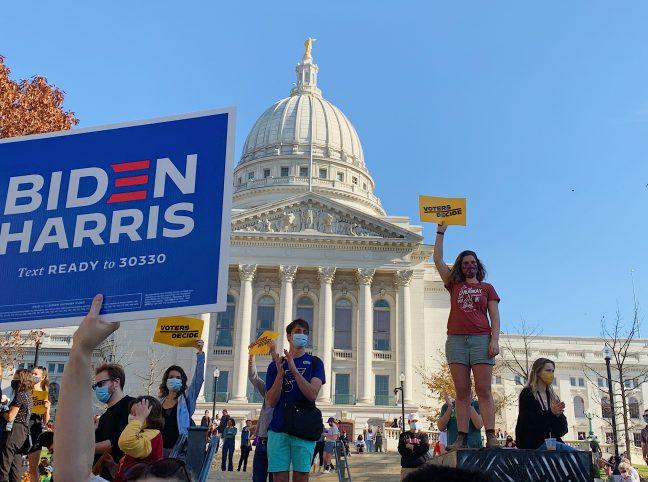Last week, President Joe Biden attended a town hall in Milwaukee to discuss a range of issues and policies he hopes to tackle during the beginning of his term.
President Biden told CNN interviewer Anderson Cooper he hopes to provide roughly 11 million undocumented immigrants a path towards citizenship and dramatically expand the number of refugees the United States accepts each year.
The White House website states this bill is part of the president’s commitment to “modernize our immigration system.”
And he is right. If passed, Biden’s bill would be the largest reform on U.S. immigration laws in decades.
Specifically, Biden’s proposals would implement some long-desired liberal reforms, as well as peel back many Trump-era enactments.
Providing a path to citizenship for undocumented immigrants is one of the hallmarks of the Democrats’ policy goals. Biden reaffirmed this at his Milwaukee town hall.
Democratic congressmen have attempted to pass such a measure for years now — two similar bills failed in Congress in 2007 and 2013. President Obama attempted to protect illegal migrants through an executive order in 2014 but his actions were quickly challenged and overturned in court.
Now, polls show increasing support among affiliates of both political parties for amnesty for undocumented immigrants. Many also believe Biden hopes to pass immigration reform now so he can provide tangible results for moderate Latino voters who supported his campaign.
Director of the Milwaukee-based “Voces de la Frontera” advocacy group Christine Neumann-Ortiz projects 90,000 undocumented workers reside in Wisconsin, working primarily in health care and food service.
“I would say for myself and other Latino and immigrant families that were deeply involved in the effort to not just drive out Trump, but to help President-Elect Biden and Vice President-Elect Kamala Harris, that was done on the basis of their commitment to champion immigration, both around pandemic relief and immediate protections,” Neumann-Ortiz said. “They had an impressive platform on immigration that reflected the demands of the movement over the last 20 years.”
Other motivations for immigration reform include removing many controversial policies implemented by former President Trump. This week, Biden began by removing last year’s ban on green card workers, allowing thousands of migrants to come to the United States to work legally. Biden also already ended the controversial “Muslim Ban” on his first day in office.
Biden hopes to solve many other lasting issues with his legislation, such as the lingering effects of family separations and Trump’s reduction of the number of refugees accepted annually.
Biden must address how “fake news” claims and media distrust continue to fuel Trump supporters
Other measures in Biden’s immigration bill reflect his sympathy with some Trump-era policies. For example, Biden hopes to continue to strengthen border security by investing in more advanced screening technology and protective infrastructure at the border to combat drug trafficking.
Biden also advocates increasing U.S. agencies’ roles in Latin American countries by personally combating and collecting intelligence on drug cartels. He proposes establishing “Designated Processing Centers” across Latin America to distribute migrants to the United States. An overall ambitious plan, which would be incredibly invasive in the domestic affairs of other countries.
Biden’s plan would be the most streamlined route for immigration in decades. Not since 1965 — when the Immigration and Nationality Act ended racial barriers from entry — have U.S. immigration laws changed this significantly. A reform of this magnitude will likely cause a similar ripple of effects previous reforms did.
Biden’s immigration legislation hopes to address decades of neglect by Congress and turn the direction of America’s attitude towards immigration.
UW students react to 2020 election results with joy, hope amid pandemic anxiety
“Even if you’re not involved in politics at all, you have probably heard me say this 1,000 times and matter — that everyone is entitled to be treated with decency, with dignity,” Biden said in Milwaukee. “Everyone is entitled to that.”
The history of American immigration constantly battled with this principle. For decades, many people were banned from coming to the U.S. or unjustly deported because of their skin color.
This past year, Trump lowered the country’s overall refugee quota to just 15,000, (with only just over 5,000 actually accepted) starkly contrasting Obama’s last year in office with a quota of 110,000.
Passing this bill is a positive step toward making American laws more just for aspiring immigrants. But some of his more troubling measures regarding increased surveillance and intervention in Latin American affairs should be reconsidered before they are forgotten amid the wave of progressive optimism for this bill.
While ambitious in its goals, any smaller version of this bill would enact ever-needed changes on the troubled American immigration system.
Hayden Kolowrat ([email protected]) is a graduate student studying Southeast Asian studies.














